- Home
- FPMT Homepage
Foundation for the Preservation of the Mahayana Tradition
The FPMT is an organization devoted to preserving and spreading Mahayana Buddhism worldwide by creating opportunities to listen, reflect, meditate, practice and actualize the unmistaken teachings of the Buddha and based on that experience spreading the Dharma to sentient beings. We provide integrated education through which people’s minds and hearts can be transformed into their highest potential for the benefit of others, inspired by an attitude of universal responsibility and service. We are committed to creating harmonious environments and helping all beings develop their full potential of infinite wisdom and compassion. Our organization is based on the Buddhist tradition of Lama Tsongkhapa of Tibet as taught to us by our founders Lama Thubten Yeshe and Lama Thubten Zopa Rinpoche.
- Willkommen
Die Stiftung zur Erhaltung der Mahayana Tradition (FPMT) ist eine Organisation, die sich weltweit für die Erhaltung und Verbreitung des Mahayana-Buddhismus einsetzt, indem sie Möglichkeiten schafft, den makellosen Lehren des Buddha zuzuhören, über sie zur reflektieren und zu meditieren und auf der Grundlage dieser Erfahrung das Dharma unter den Lebewesen zu verbreiten.
Wir bieten integrierte Schulungswege an, durch denen der Geist und das Herz der Menschen in ihr höchstes Potential verwandelt werden zum Wohl der anderen – inspiriert durch eine Haltung der universellen Verantwortung und dem Wunsch zu dienen. Wir haben uns verpflichtet, harmonische Umgebungen zu schaffen und allen Wesen zu helfen, ihr volles Potenzial unendlicher Weisheit und grenzenlosen Mitgefühls zu verwirklichen.
Unsere Organisation basiert auf der buddhistischen Tradition von Lama Tsongkhapa von Tibet, so wie sie uns von unseren Gründern Lama Thubten Yeshe und Lama Thubten Zopa Rinpoche gelehrt wird.
- Bienvenidos
La Fundación para la preservación de la tradición Mahayana (FPMT) es una organización que se dedica a preservar y difundir el budismo Mahayana en todo el mundo, creando oportunidades para escuchar, reflexionar, meditar, practicar y actualizar las enseñanzas inconfundibles de Buda y en base a esa experiencia difundir el Dharma a los seres.
Proporcionamos una educación integrada a través de la cual las mentes y los corazones de las personas se pueden transformar en su mayor potencial para el beneficio de los demás, inspirados por una actitud de responsabilidad y servicio universales. Estamos comprometidos a crear ambientes armoniosos y ayudar a todos los seres a desarrollar todo su potencial de infinita sabiduría y compasión.
Nuestra organización se basa en la tradición budista de Lama Tsongkhapa del Tíbet como nos lo enseñaron nuestros fundadores Lama Thubten Yeshe y Lama Zopa Rinpoche.
A continuación puede ver una lista de los centros y sus páginas web en su lengua preferida.
- Bienvenue
L’organisation de la FPMT a pour vocation la préservation et la diffusion du bouddhisme du mahayana dans le monde entier. Elle offre l’opportunité d’écouter, de réfléchir, de méditer, de pratiquer et de réaliser les enseignements excellents du Bouddha, pour ensuite transmettre le Dharma à tous les êtres. Nous proposons une formation intégrée grâce à laquelle le cœur et l’esprit de chacun peuvent accomplir leur potentiel le plus élevé pour le bien d’autrui, inspirés par le sens du service et une responsabilité universelle. Nous nous engageons à créer un environnement harmonieux et à aider tous les êtres à épanouir leur potentiel illimité de compassion et de sagesse. Notre organisation s’appuie sur la tradition guéloukpa de Lama Tsongkhapa du Tibet, telle qu’elle a été enseignée par nos fondateurs Lama Thoubtèn Yéshé et Lama Zopa Rinpoché.
Visitez le site de notre Editions Mahayana pour les traductions, conseils et nouvelles du Bureau international en français.
Voici une liste de centres et de leurs sites dans votre langue préférée
- Benvenuto
L’FPMT è un organizzazione il cui scopo è preservare e diffondere il Buddhismo Mahayana nel mondo, creando occasioni di ascolto, riflessione, meditazione e pratica dei perfetti insegnamenti del Buddha, al fine di attualizzare e diffondere il Dharma fra tutti gli esseri senzienti.
Offriamo un’educazione integrata, che può trasformare la mente e i cuori delle persone nel loro massimo potenziale, per il beneficio di tutti gli esseri, ispirati da un’attitudine di responsabilità universale e di servizio.
Il nostro obiettivo è quello di creare contesti armoniosi e aiutare tutti gli esseri a sviluppare in modo completo le proprie potenzialità di infinita saggezza e compassione.
La nostra organizzazione si basa sulla tradizione buddhista di Lama Tsongkhapa del Tibet, così come ci è stata insegnata dai nostri fondatori Lama Thubten Yeshe e Lama Zopa Rinpoche.
Di seguito potete trovare un elenco dei centri e dei loro siti nella lingua da voi prescelta.
- 欢迎 / 歡迎
简体中文
“护持大乘法脉基金会”( 英文简称:FPMT。全名:Foundation for the Preservation of the Mahayana Tradition) 是一个致力于护持和弘扬大乘佛法的国际佛教组织。我们提供听闻,思维,禅修,修行和实证佛陀无误教法的机会,以便让一切众生都能够享受佛法的指引和滋润。
我们全力创造和谐融洽的环境, 为人们提供解行并重的完整佛法教育,以便启发内在的环宇悲心及责任心,并开发内心所蕴藏的巨大潜能 — 无限的智慧与悲心 — 以便利益和服务一切有情。
FPMT的创办人是图腾耶喜喇嘛和喇嘛梭巴仁波切。我们所修习的是由两位上师所教导的,西藏喀巴大师的佛法传承。
繁體中文
護持大乘法脈基金會”( 英文簡稱:FPMT。全名:Found
ation for the Preservation of the Mahayana Tradition ) 是一個致力於護持和弘揚大乘佛法的國際佛教組織。我們提供聽聞, 思維,禪修,修行和實證佛陀無誤教法的機會,以便讓一切眾生都能 夠享受佛法的指引和滋潤。 我們全力創造和諧融洽的環境,
為人們提供解行並重的完整佛法教育,以便啟發內在的環宇悲心及責 任心,並開發內心所蘊藏的巨大潛能 — 無限的智慧與悲心 – – 以便利益和服務一切有情。 FPMT的創辦人是圖騰耶喜喇嘛和喇嘛梭巴仁波切。
我們所修習的是由兩位上師所教導的,西藏喀巴大師的佛法傳承。 察看道场信息:
- FPMT Homepage
- News/Media
-
- Study & Practice
-
-
- About FPMT Education Services
- Latest News
- Programs
- New to Buddhism?
- Buddhist Mind Science: Activating Your Potential
- Heart Advice for Death and Dying
- Discovering Buddhism
- Living in the Path
- Exploring Buddhism
- FPMT Basic Program
- FPMT Masters Program
- FPMT In-Depth Meditation Training
- Maitripa College
- Lotsawa Rinchen Zangpo Translator Program
- Universal Education for Compassion & Wisdom
- Online Learning Center
-
- Prayers & Practice Materials
- Overview of Prayers & Practices
- Full Catalogue of Prayers & Practice Materials
- Explore Popular Topics
- Benefiting Animals
- Chenrezig Resources
- Death & Dying Resources
- Lama Chopa (Guru Puja)
- Lama Zopa Rinpoche: Compendium of Precious Instructions
- Lama Zopa Rinpoche: Life Practice Advice
- Lama Zopa Rinpoche Practice Series
- Lamrim Resources
- Mantras
- Prayer Book Updates
- Purification Practices
- Sutras
- Thought Transformation (Lojong)
- Audio Materials
- Dharma Dates - Tibetan Calendar
- Translation Services
- Publishing Services
- Ways to Offer Support
- Prayers & Practice Materials
-
- Teachings and Advice
- Find Teachings and Advice
- Lama Zopa Rinpoche Advice Page
- Lama Zopa Rinpoche: Compendium of Precious Instructions
- Lama Zopa Rinpoche Video Teachings
- ༧སྐྱབས་རྗེ་བཟོད་པ་རིན་པོ་ཆེ་མཆོག་ནས་སྩལ་བའི་བཀའ་སློབ་བརྙན་འཕྲིན།
- Podcasts
- Lama Yeshe Wisdom Archive
- Buddhism FAQ
- Dharma for Young People
- Resources on Holy Objects
- Teachings and Advice
-
-
*If a menu item has a submenu clicking once will expand the menu clicking twice will open the page.
-
-
- Centers
-
- Teachers
-
- Projects
-
-
-
-
*If a menu item has a submenu clicking once will expand the menu clicking twice will open the page.
-
-
- FPMT
-
- Shop
-
-
-
The Foundation Store is FPMT’s online shop and features a vast selection of Buddhist study and practice materials written or recommended by our lineage gurus. These items include homestudy programs, prayers and practices in PDF or eBook format, materials for children, and other resources to support practitioners.
Items displayed in the shop are made available for Dharma practice and educational purposes, and never for the purpose of profiting from their sale. Please read FPMT Foundation Store Policy Regarding Dharma Items for more information.
-
-
20
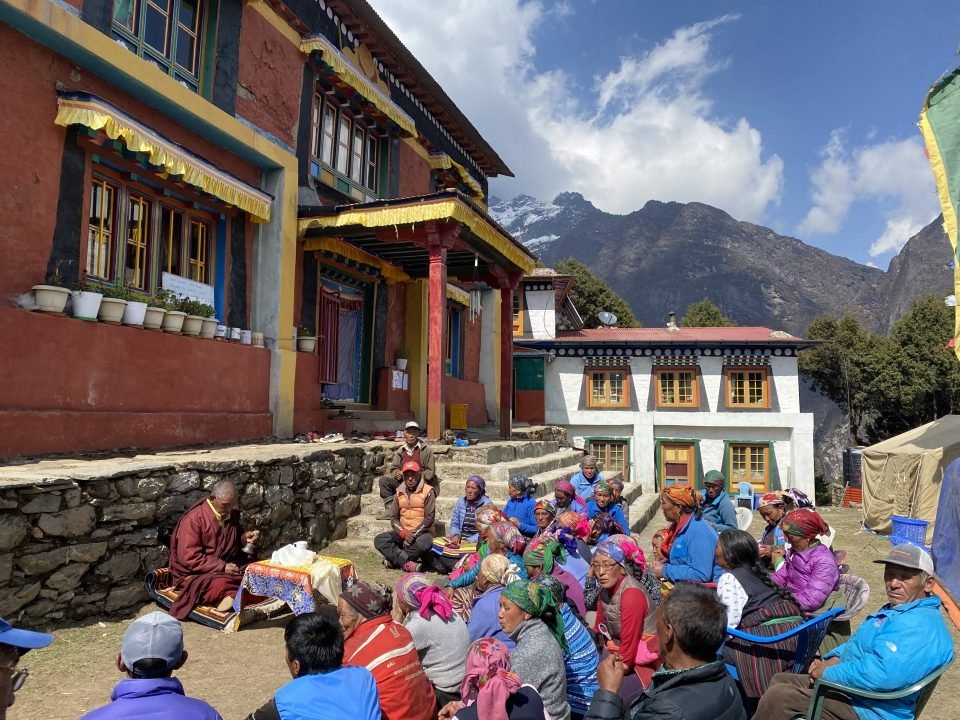
An outdoor puja for Lama Zopa Rinpoche’ swift return in front of Lawudo Gompa. Photo by Alison Murdoch.
Two weeks after Lama Zopa Rinpoche entered his final meditation, FPMT students Paula Chichester and Alison Murdoch took the opportunity to return to Lawudo and join with Rinpoche’s family in some of the ceremonies taking place there. A week later Ven. Amy Miller arrived with a pilgrimage group, and subsequently returned alone for a period of practice and retreat. Here is a brief overview of what took place during this unique and profound time, from Alison Murdoch:
As soon as the sad news reached Lawudo, Ani Ngawang Samten, Rinpoche’s sister, started making plans to go down to the Kathmandu valley. Her grief at suddenly losing her guru and brother in this way has to be unimaginable, especially as it is eight years since Rinpoche was last able to visit in person. She left the next day by helicopter and reached Kopan about an hour before Rinpoche finished his meditation. “It felt as if he would open his eyes and speak to me at any moment,” she said later. Ven. Tsultrim, a Swiss nun who has been at Lawudo since Spring 2022, generously agreed to stay behind to look after Ashan (Rinpoche’s uncle, aged 98) and Tsultrim Norbu, who is now in his 70s. Without this kind offer, it would probably have been impossible for Ani Ngawang Samten to leave at such short notice. At Kopan she was joined by her brother Sangay and his wife, by Geshema Thubten Zangmo, and by other members of the family who had immediately flown over from the USA.
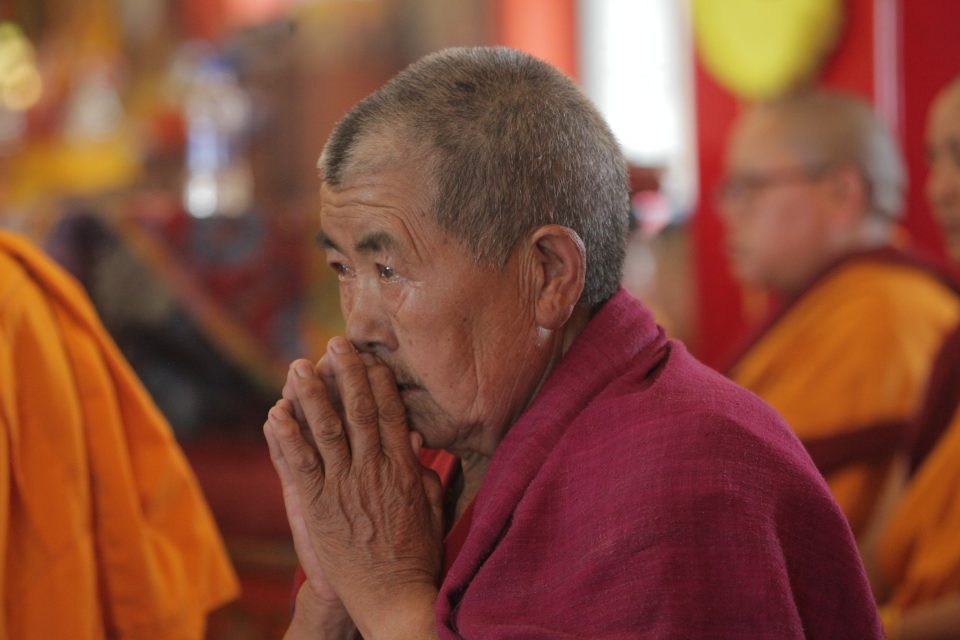
Ani Samten at Heruka Lama Chopa, Kopan, Nepal, April 19 2023. Photo by Capucine Redon.
The first week at Lawudo after Rinpoche showed the aspect of leaving his body was relatively quiet. Ven. Tsultrim welcomed the arrival of Ven Trinley from Tenboche Monastery, who joined her in carrying out daily Cittamani Tara pujas. On the fourteenth day after Rinpoche’s passing Ven. Ngawang Nyendak came to lead a Chenrezig puja. Ven. Nyendak is a highly accomplished tantric practitioner who at Lama Zopa Rinpoche’s request carries out regular practices at Lawudo dedicated to the flourishing of the FPMT. By this time Rinpoche’s cousin Nyima Tashi had arrived and started making preparations for more extensive prayers and practices. The weather turned unseasonably cold, with a light snow falling all day like a blessing.
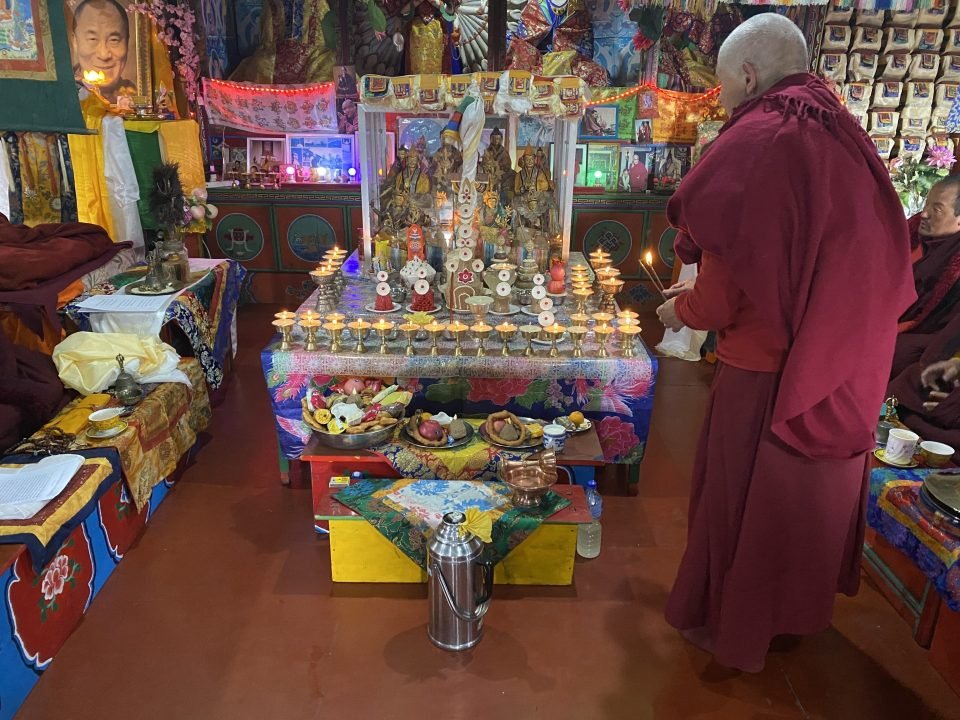
Light offerings in Lawudo Gompa. Photo by Alison Murdoch.
On the twenty-first day, the monks from Thame Monastery came to lead an extensive all-day Chenrezig puja in the gompa, joined by Tenzin Trinley the resident lama at nearby Charok Hermitage. The weather suddenly cleared, and day after day there were radiant blue skies. The monks returned again on the 28th day for a two-day puja, presided over by the young Thame Rinpoche. Ashan offered the mandala on the first day, and Anila Ngawang Samten on the second day. It was an unforgettable sight to see the gompa packed with sangha, lights and offerings, and an even more extraordinary sound when all its drums, cymbals, horns, oboes, conch shells and thigh bone trumpets echoed out over the valley. On the 35th day, the nuns from Thamo carried out a Vajrayogini self-initiation, and on the forty-second and forty-ninth days there were extensive pujas dedicated to Rinpoche in the gompas at Thame and Tenboche. (The Thame monks weren’t permitted to return to Lawudo for these final pujas due to the imminent Mani Rimdu celebrations). On each of the other six days of the week, Ven Tsultrim led a Cittamani Tara puja in either the gompa or the cave.
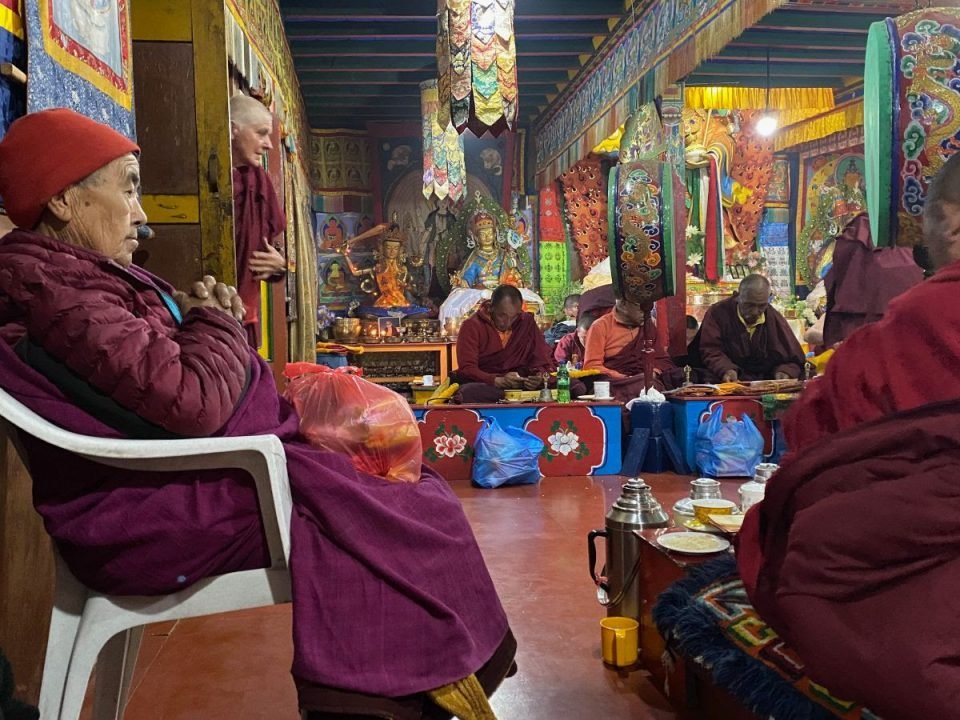
Anila Ngawang Samten joins the puja with the Thame monks. Photo by Alison Murdoch.
Despite the challenges of Lawudo Gompa being so remote, over two hours’ walk from the nearest shop, in true Sherpa style these pujas involved extensive tsog offerings. For the main puja on the twenty-eighth day, huge bags of tsog were distributed not only to everyone who attended but also hand-delivered to every family in the valley. In addition to bottles of fizzy drinks, packets of crisps and biscuits and fresh fruit (all rare delicacies at an elevation of 14,000 feet) the bags of tsog included the traditional deep-fried khapse and individual tormas made of tsampa, butter and sugar. Nyima Tashi’s numerous shopping trips to Namche Bazaar would be followed the next day by a train of animals and porters carrying heavy sacks of offerings up the mountainside, and he organized five teams of Sherpa volunteers to make the khapse and tormas and to fill and distribute the mountain of tsog. Other volunteers made extensive water bowl offerings or rolled cotton wool into wicks for the hundreds of silver and copper butter lamps, while a team of smiling nuns kept everyone supplied with butter and sweet tea. The space under the library was rapidly converted into an additional kitchen and a chef was hired to cook copious meals for all the volunteers and visitors. Ven. Nyendak also led extra practices in the courtyard for all the Sherpas who couldn’t fit into the gompa.
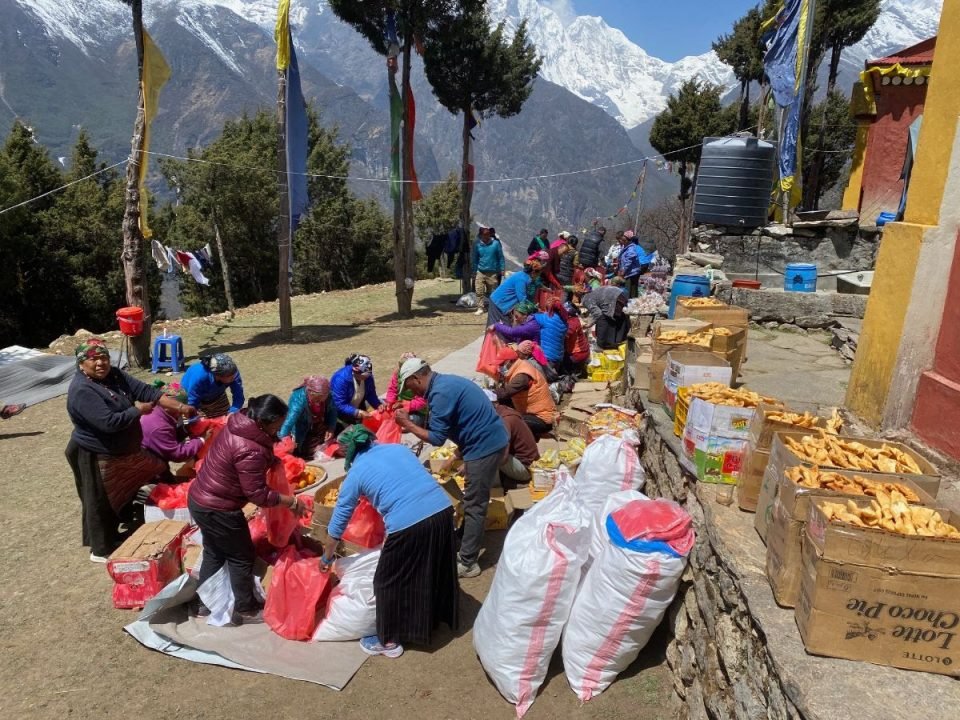
Teams of local Sherpas assemble the bags of tsog. Photo by Ven. Alison Murdoch.
This was a historic occasion, never to be repeated. One of the most moving moments was when Anila Ngawang Samten and her brother Sangay returned by helicopter with a set of Rinpoche’s robes, which were carried ceremoniously up the juniper-lined path from Mende and installed with prayers and offerings on His throne in the gompa. Now that the crowds of mourners have departed, please keep the family in your prayers as they begin to come to terms with their immense personal loss.
Please read previously published articles about Lawudo Gompa and Retreat Center.
Please consider subscribing to the Lawudo newsletter which is published four times each year on the major holy days. For more information about Lawudo Gompa and Retreat Center, please visit the Lawudo Gompa website. You can also follow Lawudo on Facebook.
- Tagged: lawudo, lawudo retreat centre
- Home
- News/Media
- Study & Practice
- About FPMT Education Services
- Latest News
- Programs
- New to Buddhism?
- Buddhist Mind Science: Activating Your Potential
- Heart Advice for Death and Dying
- Discovering Buddhism
- Living in the Path
- Exploring Buddhism
- FPMT Basic Program
- FPMT Masters Program
- FPMT In-Depth Meditation Training
- Maitripa College
- Lotsawa Rinchen Zangpo Translator Program
- Universal Education for Compassion & Wisdom
- Online Learning Center
- Prayers & Practice Materials
- Overview of Prayers & Practices
- Full Catalogue of Prayers & Practice Materials
- Explore Popular Topics
- Benefiting Animals
- Chenrezig Resources
- Death & Dying Resources
- Lama Chopa (Guru Puja)
- Lama Zopa Rinpoche: Compendium of Precious Instructions
- Lama Zopa Rinpoche: Life Practice Advice
- Lama Zopa Rinpoche Practice Series
- Lamrim Resources
- Mantras
- Prayer Book Updates
- Purification Practices
- Sutras
- Thought Transformation (Lojong)
- Audio Materials
- Dharma Dates – Tibetan Calendar
- Translation Services
- Publishing Services
- Teachings and Advice
- Find Teachings and Advice
- Lama Zopa Rinpoche Advice Page
- Lama Zopa Rinpoche: Compendium of Precious Instructions
- Lama Zopa Rinpoche Video Teachings
- ༧སྐྱབས་རྗེ་བཟོད་པ་རིན་པོ་ཆེ་མཆོག་ནས་སྩལ་བའི་བཀའ་སློབ་བརྙན་འཕྲིན།
- Podcasts
- Lama Yeshe Wisdom Archive
- Buddhism FAQ
- Dharma for Young People
- Resources on Holy Objects
- Ways to Offer Support
- Centers
- Affiliates Area
- Teachers
- Projects
- Charitable Projects
- Make a Donation
- Applying for Grants
- News about Projects
- Other Projects within FPMT
- Support International Office
- Projects Photo Galleries
- Give Where Most Needed
- FPMT
- Shop
Translate*
*powered by Google TranslateTranslation of pages on fpmt.org is performed by Google Translate, a third party service which FPMT has no control over. The service provides automated computer translations that are only an approximation of the websites' original content. The translations should not be considered exact and only used as a rough guide.Cherishing others opens the door to every happiness for self and others.








